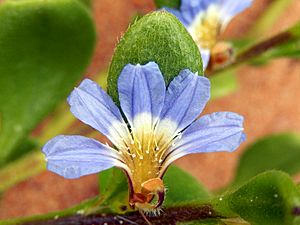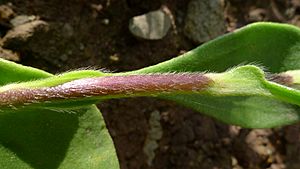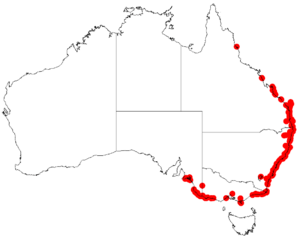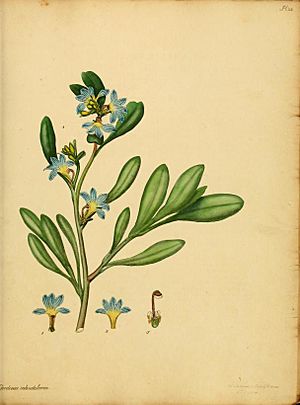Dune fan-flower facts for kids
Quick facts for kids Dune fan-flower |
|
|---|---|
 |
|
 |
|
| Scientific classification | |
| Genus: |
Scaevola (plant)
|
| Species: |
calendulacea
|
 |
|
| Occurrence data from Australasian Virtual Herbarium | |
| Synonyms | |
|
Goodenia calendulacea Andrews |
|

The dune fan-flower, officially known as Scaevola calendulacea, is a special small plant. It grows mostly on sand dunes along the coasts of eastern and southern Australia. This plant is a type of shrub that spreads out close to the ground.
This interesting plant was first written about in 1798. A botanist named Henry Cranke Andrews gave it the name Goodenia calendulacea. Later, in 1917, another scientist, George Claridge Druce, moved it to a different group of plants called Scaevola.
What the Dune Fan-Flower Looks Like
The dune fan-flower is a low-growing shrub. It usually reaches about 40 centimeters (about 16 inches) tall. You can often see its pretty flowers for most of the year.
Stems and Leaves
Its stems are covered with tiny hairs. These hairs lie flat and point forward along the stem. The leaves of the plant are simple and do not have any cuts or lobes. Each leaf can grow up to 80 millimeters (about 3 inches) long and 27 millimeters (about 1 inch) wide.
Flowers and Fruit
The flowers grow in clusters at the ends of the stems. They are a lovely blue color. The outside of the flower is fuzzy, and the inside has a beard-like patch of hairs. After the flowers bloom, they produce fruit. The fruit is round and smooth, and it can be white or a bit purplish.

